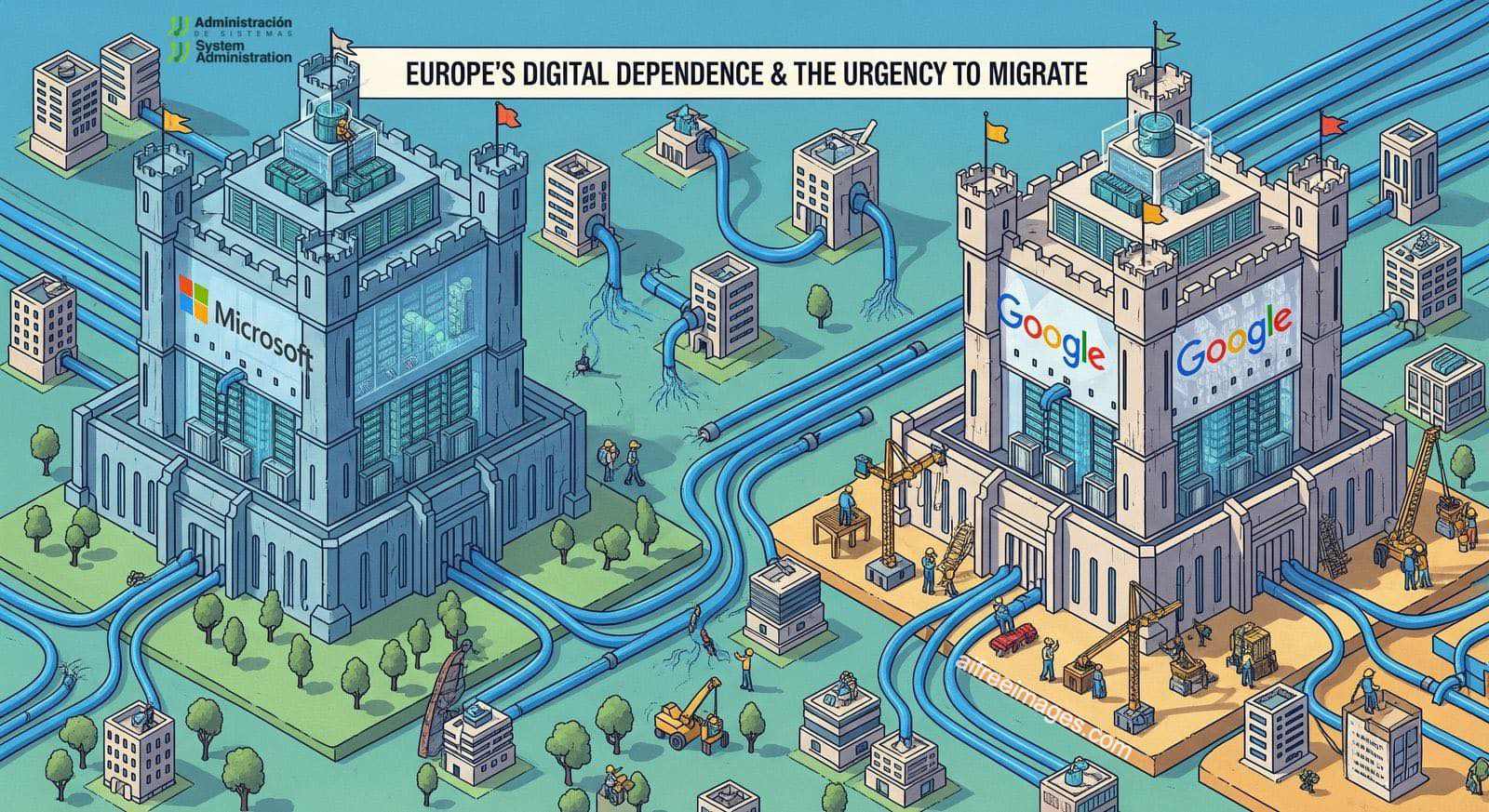The European Union has been discussing digital sovereignty for over a decade, but the facts do not match the rhetoric. Administrations, companies, and citizens heavily depend on the same familiar American companies: Microsoft, Google, and Amazon, with the dominance of Apple in desktops and mobile devices added to the mix. The current picture is clear: Windows remains omnipresent, Microsoft Office dominates office productivity, email is centered around Gmail and Exchange Online, and the European public cloud depends, in over 70%, on AWS, Microsoft Azure, and Google Cloud.
In other words: Europe neither controls its software, its productivity platforms, nor the infrastructure that stores and processes its most sensitive data.
The Illusion of “Cloud First”
European governments’ digitization plans have embraced the public cloud as if it were synonymous with modernization. But that cloud has owners: Amazon, Microsoft, and Google.
Projects like Gaia-X, created to ensure data sovereignty in Europe, have lost momentum due to a lack of political ambition and pressure from lobbies. The result is that most ministries, universities, and European businesses end up storing data on clouds subject to the Cloud Act in the US, which allows the U.S. government to demand access to European citizens’ information.
The message is clear: data sovereignty does not exist while we depend on foreign infrastructures.
Windows and Office: a cultural monopoly
It’s not just about software: Microsoft Office has become a cultural standard. Universities, schools, and public administrations impose it, educating entire generations of students on the use of a closed suite.
Meanwhile, LibreOffice, despite being a European project, receives little institutional support. Transitioning to open formats would be a strategic move of the highest order, but governments look the other way. The situation is similar with operating systems: Linux has been ready for desktop use for years, and projects like SUSE, openSUSE, or Debian could become pillars of technological sovereignty. But without a decisive commitment, Windows will continue reigning by inertia.
The Opportunity for SUSE, openSUSE, and Debian
Europe already has the ingredients to build its own ecosystem. SUSE, based in Germany, is one of the few enterprise-level players capable of competing with Red Hat (IBM) on servers. Surrounding it are openSUSE and derivatives like Aeon Desktop, offering solid desktop solutions.
But companies alone are not enough: independence also requires community projects like Debian, which do not rely on shareholders or corporate mergers. A smart strategy would combine the best of both worlds: European commercial solutions with business support and 100% free projects that ensure long-term independence.
Email: a collective capitulation
Email is another critical blind spot. 80% of European universities use Google Workspace or Microsoft Exchange, meaning much of academic and government communication is subject to foreign jurisdictions.
Free solutions like Postfix, Dovecot, or Roundcube have existed for decades and could be deployed on private clouds or European consortia. Yet, the convenience and marketing of “free” from Google or the bundled closed solutions from Microsoft have easily ceded ground with little resistance.
Sovereignty or Irrelevance
The core issue is not technical but political and cultural. Europe has internalized the idea that it is cheaper to import technology than to develop it. This dynamic, which once destroyed consumer electronics industries, is now playing out in cloud, office productivity, and operating systems.
While the U.S. protects Intel or General Motors and China defends Huawei and Lenovo, Europe lets its technological champions fall and allows its most sensitive data to reside in foreign infrastructures.
If the EU does not make a radical shift, it risks becoming a dependent market where strategic technology decisions are made in Seattle, Mountain View, or Beijing, not Brussels.
Conclusion: Time to Move from Rhetoric to Action
Europe is not short of alternatives. They are there: SUSE, openSUSE, Debian, LibreOffice, Nextcloud, Open-Xchange. What is missing is political will and strategic coordination.
The steps are clear:
- Switch to Linux in administrations and universities, focusing on SUSE and Debian as core solutions.
- Enforce open formats and institutionalize LibreOffice.
- Regain control of email and critical applications using free solutions and European clouds.
- Promote sovereign clouds instead of perpetuating the monopoly of AWS, Azure, and Google Cloud.
Europe’s future depends on more than just software change: it hinges on its ability to decide its digital destiny. Either it invests now in technological sovereignty or risks becoming a mere captive client in the giants’ war.

